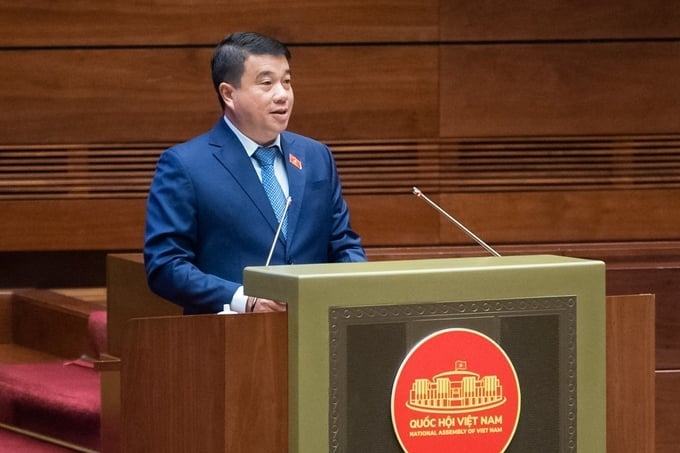May 23, 2025 | 20:43 GMT +7
May 23, 2025 | 20:43 GMT +7
Hotline: 0913.378.918
May 23, 2025 | 20:43 GMT +7
Hotline: 0913.378.918

Mr. Y Thanh Ha Nie Kdam, Chairman of the National Assembly Council of Ethnic Affairs and Deputy Head of the National Assembly Supervision Delegation, presenting the report of the National Assembly Supervision Delegation. Photo: National Assembly.
In continuation of the 6th session on the morning of October 30, under the chairmanship of the Chairman of the National Assembly Vuong Dinh Hue, the National Assembly discussed the implementation of the National Assembly's Resolution regarding National Target Programs. Vice Chairman of the National Assembly, Mr. Tran Quang Phuong, chaired the session.
The opening of the working session was marked by the presentation of the Report by Mr. Y Thanh Ha Nie Kdam, Chairman of the National Assembly Council of Ethnic Affairs and Deputy Head of the National Assembly Supervision Delegation. Accordingly, the report addressed issues concerning the implementation of the National Assembly's Resolutions on National Target Programs.
Regarding the results of the National Target Program on new rural construction, Mr. Y Thanh Ha Nie Kdam, Chairman of the Council for Ethnic Affairs of the National Assembly, and Deputy Head of the National Assembly Supervision Delegation, reported that the program received a total funding of 196.332 trillion Vietnamese dong for the implementation period between 2021 and 2025, as approved under Resolution No. 25/2021/QH15 dated July 28, 2021. In addition to general policies, the program also consists of six major focuses, to be implemented across all 63 provinces and cities nationwide.
With the aim of improving on the results of previous phases, the nationwide new rural development movement has: "Effectively associated with the restructuring of the agricultural sector, rural economic development, urbanization process, with a focus on depth, efficiency, and sustainability."
The organizational structure to implement the new rural program has been reinforced from the Central to local levels. Planning and fund allocation activities are deployed based on principles and regulations.
As of June 30, 2023, Vietnam has 6,022 out of 8,177 communes, or 73.65%, meeting the standards of new rural areas. Furthermore, 1,331 communes have achieved the advanced new rural area status and 176 communes have achieved the exemplary new rural area status. There are 263 out of 644 district-level administrative units, or 40.8%, recognized for achieving the new rural area status. All of the communes in nineteen provinces and centrally-governed cities have achieved the new rural area status.
However, the implementation process still faces certain challenges including the excessive number of directives, management documents, and guidance from both central and local governments, which has resulted in delayed, inconsistent, and inadequately revised or supplemented issues.
The allocation of central budget investments for development has been notably sluggish, marked by disproportionately high non-corresponding proportions. This issue has resulted in difficulties for impoverished provinces. The disbursement progress of the central budget from 2021 to 2025 falls short of the required pace, specifically in terms of public investment, with only 9.17% of the annual fund plan disbursed by June 30, 2023.
"The results of new rural construction exhibit significant disparities and unsustainability; some regions lack determination and display discernible signs of decline in the implementation of new rural construction," remarked Mr. Y Thanh Ha Nie Kdam.

Minister of Agriculture and Rural Development Le Minh Hoan attended the National Assembly session on October 30. Photo: Pham Thang.
Regarding the Sustainable National Target Program from 2021 to 2025, the report has highlighted several existing limitations, including the delayed issuance of program documents as required under Resolution 24.
Local governments have proposed the need for amendments and supplements to unsatisfactory documents. Additionally, the allocation of central budget has been slow, with disproportionately high non-corresponding proportions. The integration of funds has also faced many difficulties and challenges.
The effective empowerment and active involvement of communities and individuals in poverty reduction efforts have not been substantively realized. There is a narrow focus on evaluating the reduction of the poverty rate in impoverished districts. As a result, they failed to comprehensively assess the actual increase in the average annual income per capita. Moreover, the yearly decrease in poverty rate has not accurately reflected the complete impact of the program.
Regarding the National Target Program for Socio-Economic Development in Ethnic Minority and Mountainous Areas, the issuance of program management documents has also been delayed. After more than 1 year and 2 months since the National Assembly established the investment policy under Resolution 120/2020/QH14, the Prime Minister has only recently issued Decision No. 1719/QD-TTg to approve the program.
Moreover, the ministries and departments have been inactive in releasing guidance documents for implementing projects and sub-projects. The quality of the documents is inadequate, often requiring amendments, revisions, and supplements after their issuance.
As of June 2023, 21 provinces have failed to establish their individual working groups. The central budget allocation progress is slow, leading to changes in the implementation scope as well as feasibility of several policies.
Translated by Nguyen Hai Long

(VAN) WWF, GIZ, IUCN, UNDP call for biodiversity conservation and sustainable development must be regarded as a unity in strategies for a green future.

(VAN) On celebration of International Day for Biological Diversity, Deputy Minister Nguyen Quoc Tri called for practical actions to address nature and biodiversity conservation.

(VAN) Dr. Hoang Thi Thanh Nhan – Deputy Director of the Nature and Biodiversity Conservation Agency – highlighted this on the International Day for Biological Diversity, May 22, 2025.
![Ho Chi Minh city adapts to climate change: [2] Accelerating action](https://t.ex-cdn.com/nongnghiepmoitruong.vn/608w/files/chiqk/2025/05/22/4024-4220-bien-doi-khi-hau-1-100626_766.jpg)
(VAN) Clearly recognizing the challenges posed by climate change, Ho Chi Minh city has swiftly shaped its policies and implemented practical solutions to adapt.

(VAN) Rice straw is no longer just a discarded byproduct, but it is becoming a green resource that helps farmers in the Mekong Delta reduce emissions and promote circular, sustainable agriculture.

(VAN) Other Effective Area-based Conservation Measures (OECMs) are solutions that contribute effectively to achieving the goals of the Kunming–Montreal Global Biodiversity Framework.

(VAN) A study assessing the carbon footprint of whiteleg shrimp farming in China shows the potential for carbon emission reduction through the use of renewable energy.